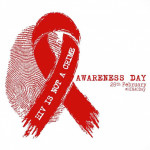
When it comes to mapping the U.S. HIV/AIDS epidemic, Iowa probably isn’t the first state that comes to mind. In 2010, with just 1,722 diagnosed cases, Iowa boasted one of the lowest per capita prevalence rates—just 68 per every 100,000 people—in the country. Yet for the past few years, the Hawkeye State—whose motto vows to “prize” and “maintain” its citizens’ liberties and rights—has become an unlikely epicenter for HIV activism thanks to one key issue: the criminal prosecution of people living with HIV.
HIV criminalization is nothing new, of course. Since the 1980s, more than 30 states enacted laws to punish people who fail to disclose their HIV status before having sex, sharing intravenous needles, or donating blood or organs. In some cases, people have even been prosecuted for spitting on others, even though experts say saliva cannot transmit HIV.
Last year, an investigation by ProPublica, a nonprofit investigative journalism website, found that prosecutors in 19 states have won convictions or guilty pleas in at least 541 HIV exposure cases since 2003. Advocates have criticized these laws, saying they unfairly single out HIV for prosecution and harsher punishment and undermine public health goals by further stigmatizing the virus.
While other states, such as Georgia, Ohio and Missouri, have aggressively pursued such cases, Iowa’s ascension as a battleground over HIV criminalization owes itself, largely, to the case of Nick Rhoades, an HIV-positive Iowa man who was arrested in 2008 after a one-night stand. He pleaded guilty to the charge known as “Criminal Transmission of HIV,” even though he was undetectable, used a condom and did not transmit the virus. Nonetheless, a judge ordered the maximum penalty under Iowa law 709C: 25 years in state prison. Soon, the severe sentence drew more attention to Rhoades’s case, eventually catching the ear of POZ founder Sean Strub.
Strub, himself a native Iowan, currently advocates full-time as the executive director of the Sero Project, a nonprofit that fights stigma and discrimination with a focus on HIV criminalization. He quickly introduced Rhoades to lawyers who would eventually launch a series of appeals and draw nationwide attention. But the cases in Iowa were still racking up, first with Rhoades, and then with Donald Bogardus, another HIV-positive Iowa man who was arrested on the same charge, this time in 2009. That was when Tami Haught, a mutual friend and local activist, got involved.
 |
| Participants of the inaugural HIV Is Not a Crime conference |
Haught, who was diagnosed with HIV in 1993, has been advocating for people with HIV since she helped launch the Community HIV and Hepatitis Advocates of Iowa Network (CHAIN) in 2005. After Rhoades’s and Bogardus’s arrests, Haught became an instrumental figure in the local movement to end such criminalization.
In 2013, together with Iowa State Senator Matt McCoy; his legislative counsel, Christian Zenti; and Cathy Engel, a Democratic research analyst in the senate’s judiciary com-mittee, CHAIN advocated for a bill that would “modernize” the state’s Criminal Transmission of Human Immunodeficiency Virus law. The new law, known as Senate File 2297, proposed a tiered sentencing structure that factored in whether offenders intend to expose their partners to HIV and whether their partners contract the virus; the law also included a “safe harbor” provision to people who wear condoms and are following a doctor’s treatment plan, and it eliminated the requirement, part of the old law, that those found guilty must register as lifetime sex offenders. This latter provision was retroactive, which meant people convicted under the old law, such as Rhoades and Bogardus, would no longer be considered sex offenders.
“When I first started, I thought I was doing it because I knew Nick, and I knew Donald, and I wanted to help them,” Haught says. But, as it turns out, the cause was more personal than even she realized.
In 1994, shortly after Haught got married, her husband was hospitalized after a mental breakdown. “After he was released from the hospital, he feared that my family would talk me into pressing charges against him since I contracted HIV from him,” she says. “So it was the fear of this law that caused him to have a mental breakdown.”
It was only while visiting a friend last year in the same hospital, two decades later, that the connection clicked. “It wasn’t until I was walking down that hallway that it really hit how personal this was to me,” Haught says.
While SF 2297 enjoyed support from local advocates and Iowa’s Department of Public Health, passage was not a slam dunk. Several county prosecutors opposed the bill, arguing that it would be nearly impossible to prove if a defendant intended to transmit the virus. National advocacy groups had concerns, too. Lambda Legal, which was representing Rhoades as his appeal worked its way to the state’s Supreme Court, criticized the new law’s safe harbor provision, which essentially requires people with HIV to wear a condom, even if they are on treatment and undetectable. And the Center for HIV Law and Policy, which also campaigns against HIV criminalization, opposed the bill for creating new felony offenses for intentionally exposing people to other diseases, such as tuberculosis, hepatitis and meningococcal disease.
But those criticisms didn’t derail the bill. In May of this year, after months of meeting with lawmakers and just hours before the state’s congressional session ended, the bill’s supporters scored a last-minute victory when legislators unanimously passed SF 2297. A month later, at a signing ceremony in the state Capitol, Iowa Governor Terry Branstad signed the bill into law and posed for photos with Rhoades and Bogardus.
 |
| Graphics for an upcoming media campaign on HIV criminalization |
At the same time, the Sero Project had been keeping busy, heading up plans to organize the HIV Is Not a Crime conference, a first-of-its-kind national gathering devoted to the subject of HIV criminalization. The four-day meeting, which convened at Grinnell College in Grinnell, Iowa—just days after Branstad signed SF 2297 into law—drew more than 170 people from 27 states to present on criminalization, to network, and to develop action plans for advocacy efforts in their home states. In a surprise event, McCoy, the state senator who helped sponsor the new Iowa bill, showed up at the reception with a pair of bolt cutters to remove Rhoades’s and Bogardus’s GPS ankle bracelets, which they were required to wear under the state’s old law.
“I think everybody went back to their states energized, ready to go, to build up the network in their community,” Haught says. “They left with a plan. They left with knowing that change had happened and each person can make a difference, that you just have to start doing it.”
Just two weeks later, the state Supreme Court delivered more good news. In a 6 to 1 ruling, the state’s highest court voted to overturn Rhoades’s conviction because prosecutors had not proven a “factual basis” for the plea, including whether transmission was likely to occur given Rhoades’s undetectable viral load.
Scott Schoettes, who represented Rhoades during the appeals and serves as Lambda Legal’s HIV Project national director, says the Iowa ruling could help change the legal landscape in other states, since it is the first to say that transmission must be “reasonably”—not just theoretically—possible.
But Rhoades isn’t out of the woods yet. His case has now been remanded to a lower court, where prosecutors could try to take Rhoades to trial, negotiate a new plea or dismiss the charges. Tom Ferguson, the Black Hawk County attorney, has not said what his office plans to do. As for other Iowans convicted under the old law—court records show there have been more than 20 convictions in the state since it was enacted in 1998—advocates are working to restore their rights under the new law, too.
“Luckily, every Iowan who was charged on 709C has now been removed from the Iowa sex offender registry,” Haught says. “There are two other people who are still in jail solely based on [the old statute] 709C, and we’re trying to help get them out of jail or at least before a parole board.”
As for Bogardus, while he will still have a felony conviction on his record, removal from the state’s sex offender registry allowed him to resume his 23-year career as a certified nurse’s assistant.
Since the conference, federal officials also have weighed in. In July, the U.S. Department of Justice issued new guidelines, urging states “to eliminate HIV-specific criminal penalties” except in cases involving sexual assault or clear intent to transmit the virus. Also, during the 20th International AIDS Conference in Melbourne, U.S. Ambassador to Australia John Berry denounced the continued existence of HIV exposure laws.
“While the United States still has laws that criminalize HIV status, we are working to become better—to do better—and to remedy our mistakes,” Berry says. “We believe that one of the most productive public policy actions that we can take is removing outdated criminalization laws from the books.”
 |
| Graphics for an upcoming media campaign on HIV criminalization |
The Sero Project lauded Berry’s statements. “The ambassador’s unambiguous declaration that HIV criminalization is an injustice and critical impediment to ending the epidemic is of enormous importance,” says the group. “HIV criminalization reform is becoming a litmus test for human rights around the world, and we are looking forward to more progress in the months and years ahead.”
Advocates such as Strub and Haught are trying to make that progress a reality. Already, they have begun laying the groundwork for a follow-up conference next year, and Haught has been busy coordinating with advocates from other states, offering guidance and using Iowa’s story as a framework for anti-criminalization campaigns in other jurisdictions.
“There’s still so much work to be done and so many more people that we need to empower and educate and reach out to,” Haught says. “The only way we’re going to end the epidemic is to empower people living with HIV to fight for our rights—to advocate, to educate and to not be ashamed.”






4 Comments
4 Comments